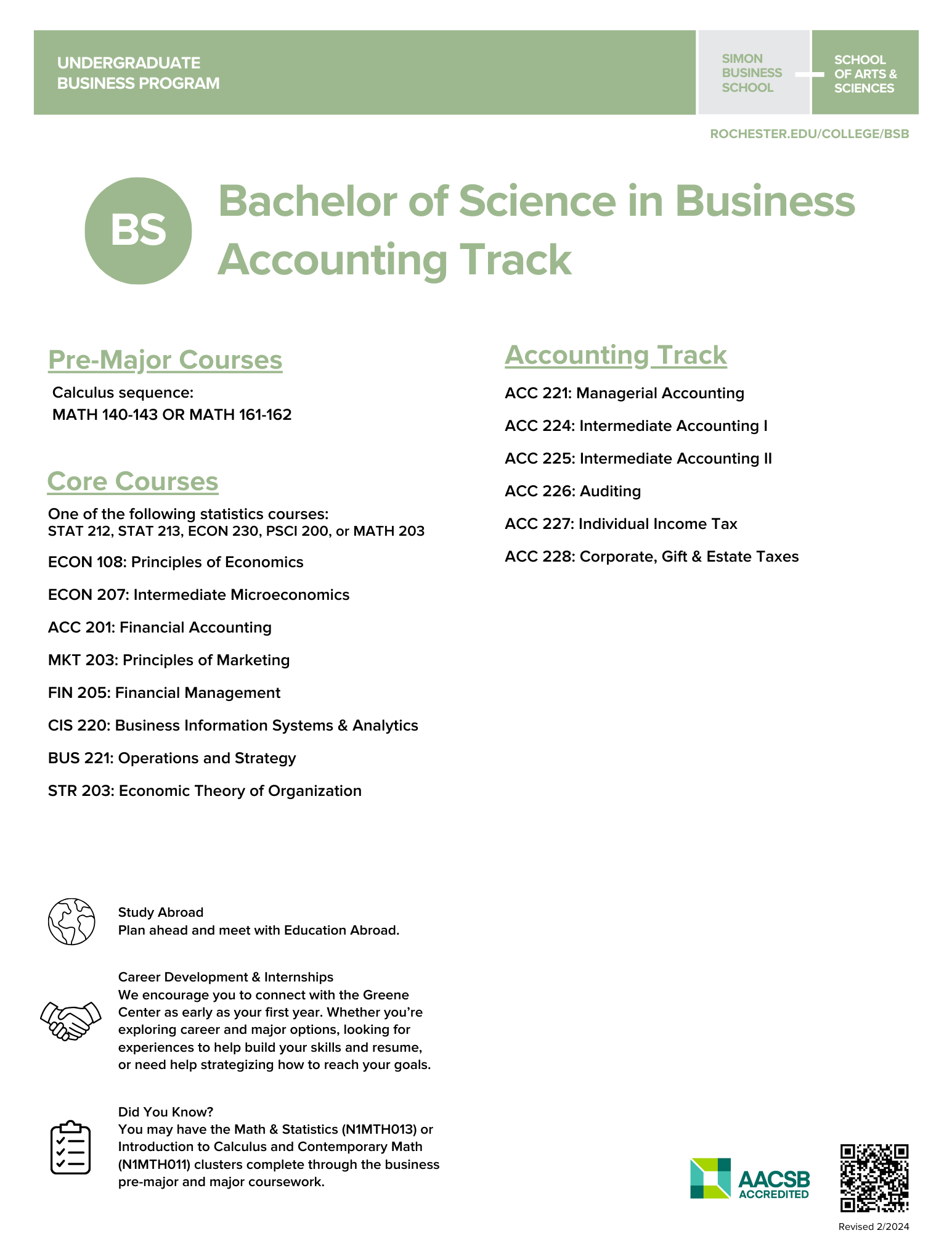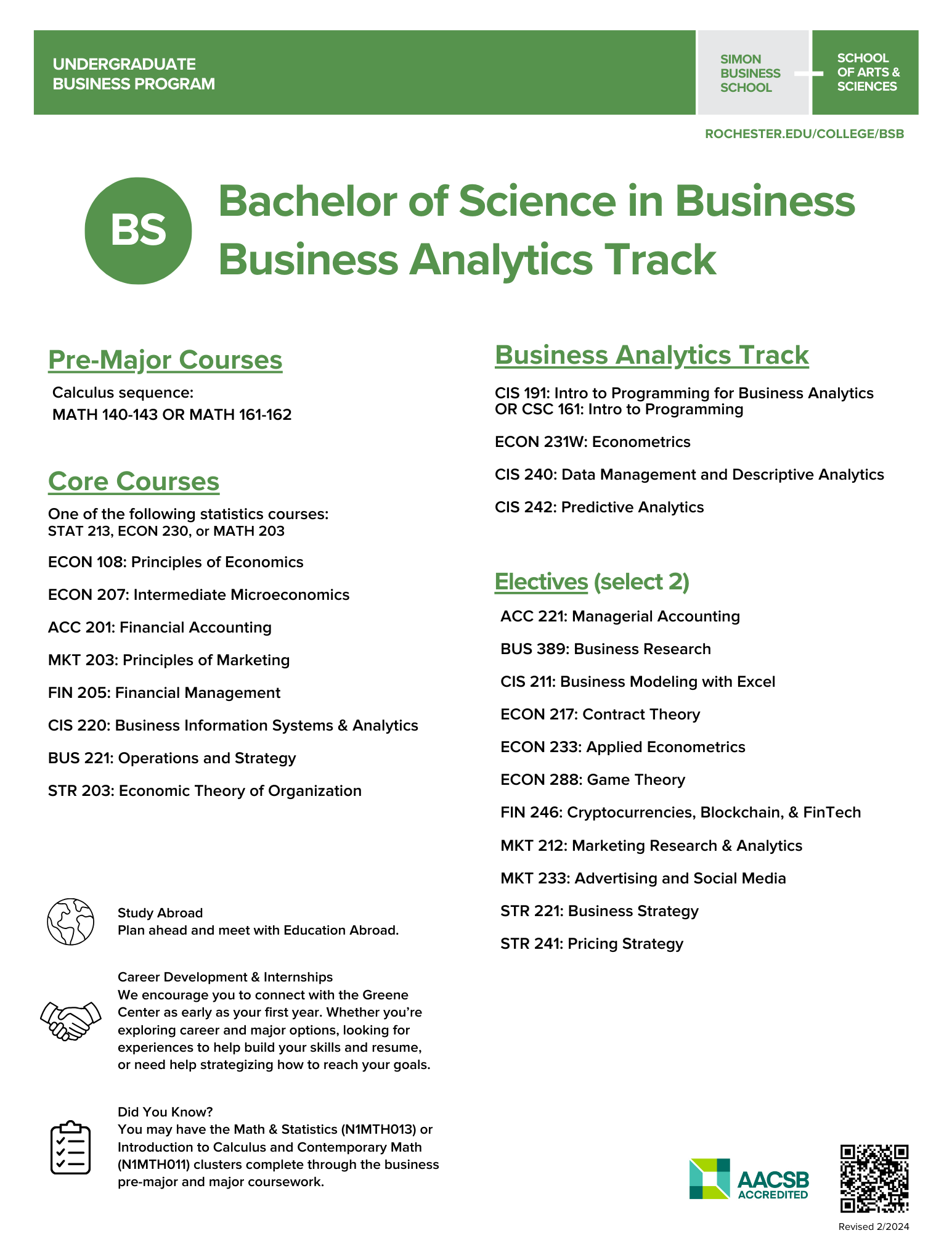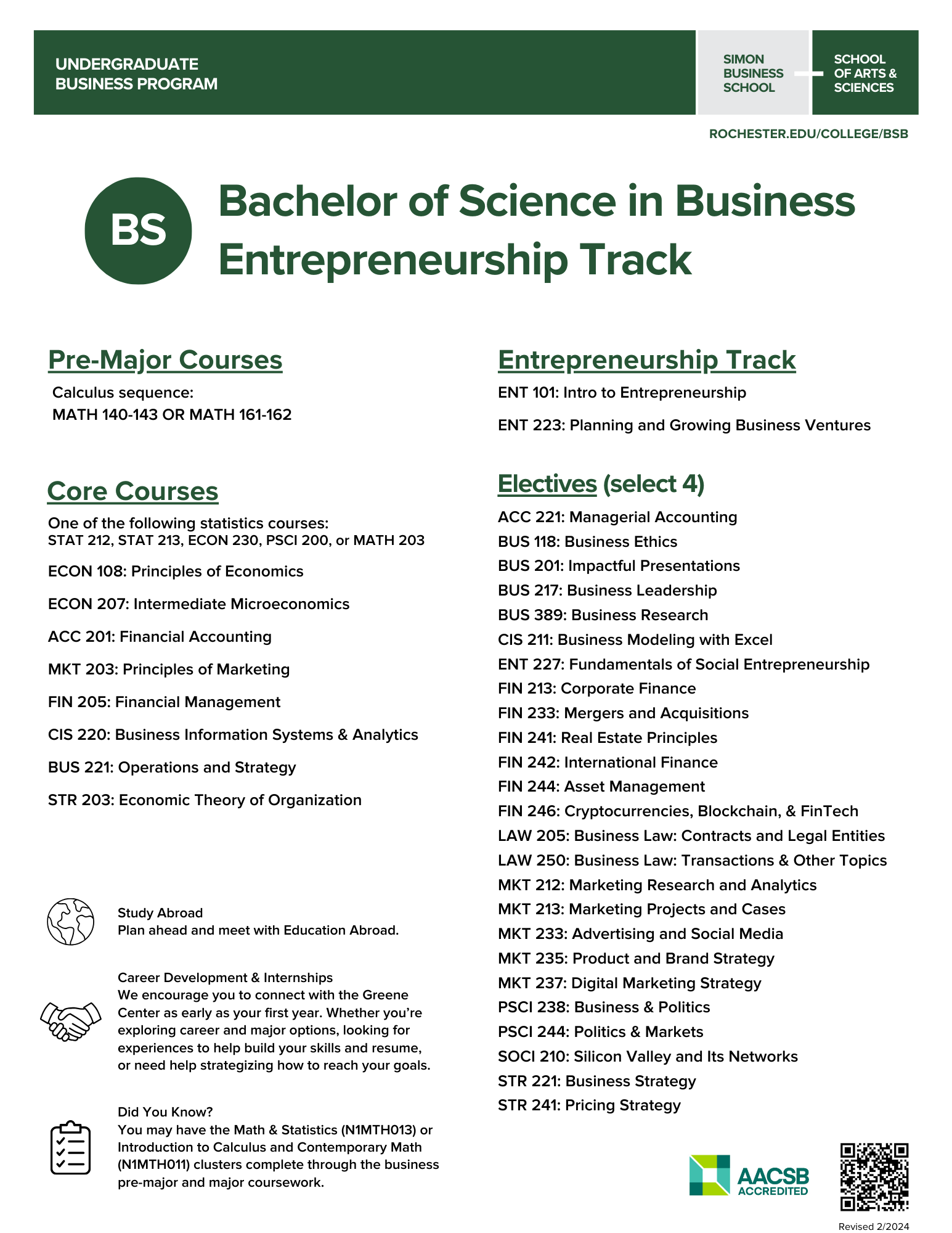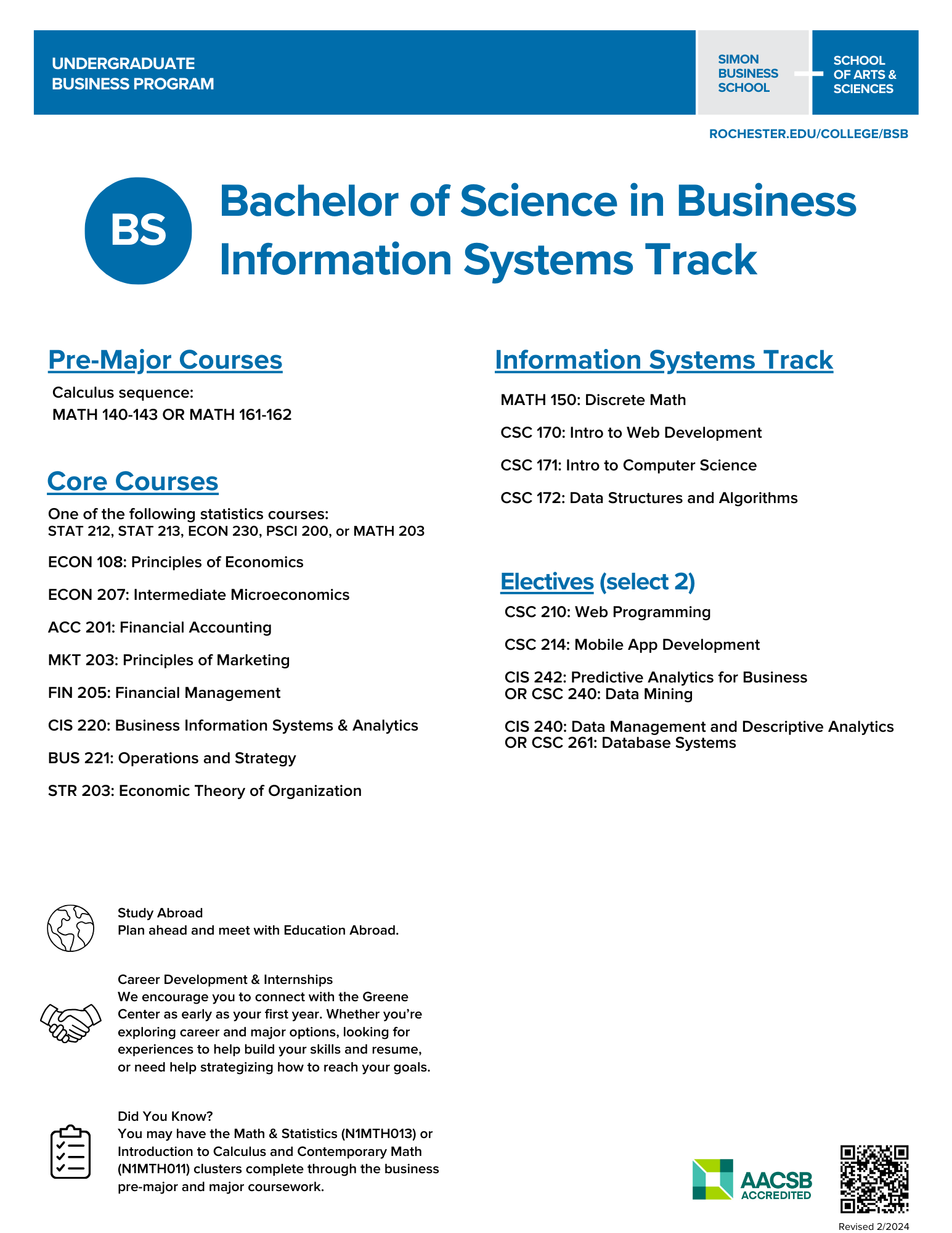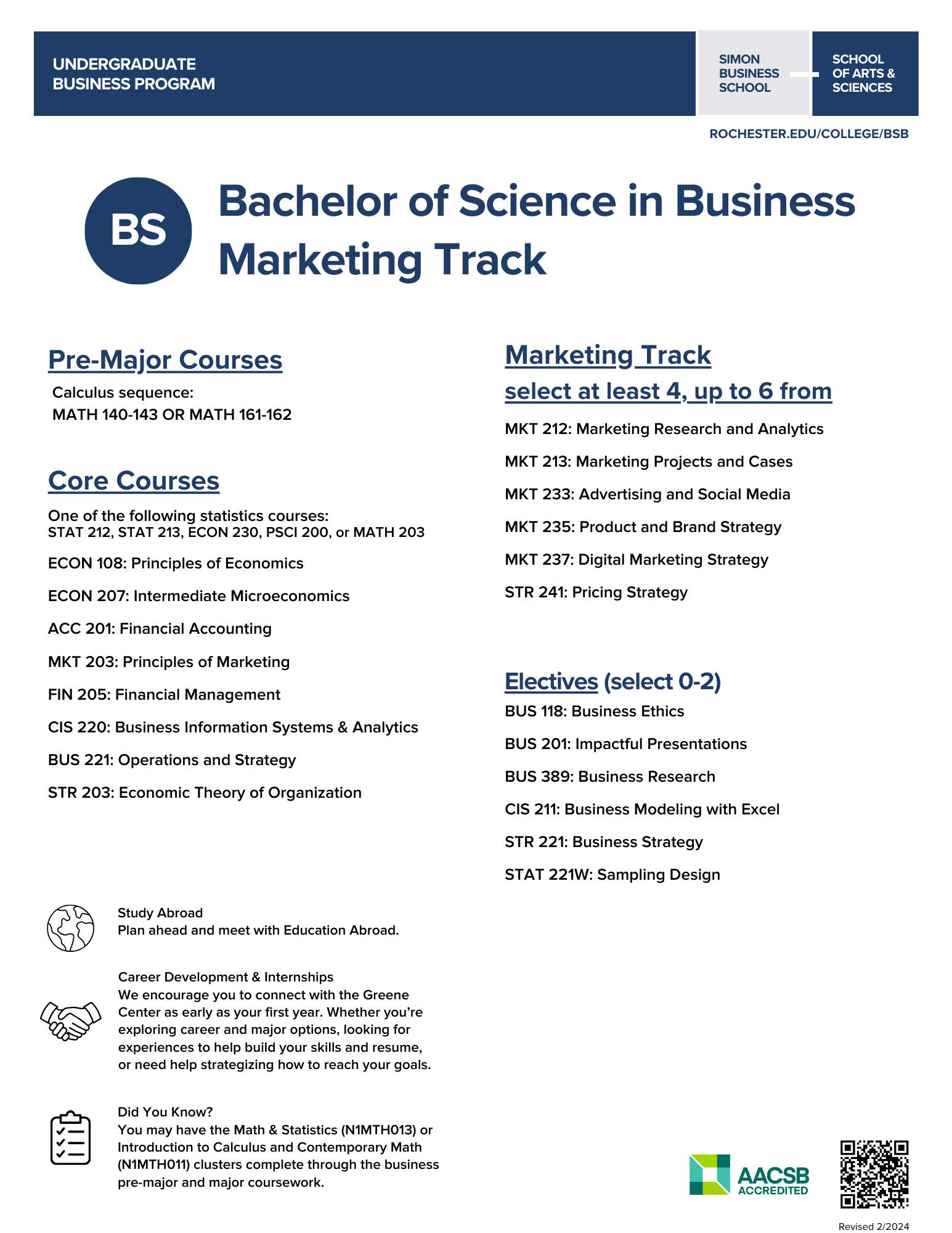BS Business Major
The BS major is best for students interested in studying a business discipline in greater depth through a specialized track. If you have questions about or want to enroll in the undergraduate business program, please contact us to schedule an advising meeting.
Requirements for a BS in business:
- Satisfactory completion of pre-major requirements in calculus and statistics (AP/IB credit is acceptable, and courses are not subject to the school’s overlap policy)
- Set of nine required core courses
- Six courses in one of the tracks listed below
Completing the required coursework above satisfies the school’s upper-level writing requirement.
Students can only officially declare for one BS Business track (accounting, business analytics, finance, entrepreneurship, information systems, or marketing).
Students are eligible to officially declare for the BS business major by submitting a major declaration form once all pre-major requirement courses have been completed.
Curriculum Changes
Curriculum updates to the BS Business major (all tracks) will take effect in Fall 2026.
Current students who have an intended or declared business major before Fall 2026 can request to complete the old curriculum or opt into the new curriculum. Students graduating on or before August 31, 2026, must follow the old curriculum. Incoming students for Fall 2026 will follow the new curriculum.
Curriculum changes have been bolded.
Old Curriculum | New Curriculum | |
| Courses Total | Pre-major + 15 | Pre-major + 15 |
| Pre-major | MATH 141-143 | MATH 141-142 |
| MATH 161-162 | MATH 161 | |
| MATH 171-172 | MATH 171 | |
| One statistics course | ||
| Core (9) | One statistics course | ECON 108 |
| ECON 108 | ECON 207 | |
| ECON 207 | ACC 201 | |
| ACC 201 | BUS 103 | |
| MKT 203 | MKT 203 | |
| FIN 205 | FIN 205 | |
| CIS 220 | CIS 220 | |
| OPS 221 | OPS 221 | |
| STR 203 | STR 203 | |
| Tracks (6) | No changes | No changes |
New Curriculum Requirements
Incoming students (first-year and transfer) for Fall 2026 must follow the new curriculum. Current business majors can opt to follow the new curriculum.
Pre-major Requirements:
One of the following calculus courses or its equivalent:
- MATH 141-142: Calculus I and Calculus II
- MATH 161: Calculus IA
- MATH 171: Honors Calculus I
- Finance track students MUST choose one of these options, which are the preferred statistics courses for all tracks:
- STAT 190: Introduction to Statistical Methodology
- ECON 230: Economic Statistics
- MATH 203: Introduction to Mathematical Statistics*
- Other options for all other tracks:
- STAT 180: Introduction to Applied Statistical Methodology
- PSCI 200: Data Analysis I
- PSCI 205: Data Analysis II
*MATH 201 is a prerequisite for MATH 203
Core Courses:
All of the following courses are required:
- ECON 108: Principles of Economics*
- ECON 207: Intermediate Microeconomics
- ACC 201: Financial Accounting
- BUS 103: Business Communication
- FIN 205: Financial Management
- MKT 203: Principles of Marketing
- CIS 220: Business Information Systems and Analytics
- OPS 221: Operations Management (previously listed as BUS 221)
- STR 203/ECON 214: Economics of Strategy and Organization
*Students who received AP or IB credit for ECON 108 must take one additional higher-level ECON course.
Old Curriculum Requirements
Students who have an intended or declared business major before Fall 2026 can request to follow the old requirements listed below. Students graduating on or before August 2026 must follow these requirements.
Pre-major Requirements:
One of the following calculus sequences or its equivalent:
- MATH 140-143
- MATH 161-162
- MATH 171–172
Core Courses:
All of the following courses are required:
- One statistics course: STAT 190, ECON 230, or MATH 203 (required for finance track) or STAT 180, PSCI 200, PSCI 205 (options for all other tracks)
- ECON 108: Principles of Economics*
- ECON 207: Intermediate Microeconomics
- ACC 201: Financial Accounting
- FIN 205: Financial Management
- MKT 203: Principles of Marketing
- CIS 220: Business Information Systems and Analytics
- OPS 221: Operations Management (previously listed as BUS 221)
- STR 203/ECON 214: Economics of Strategy and Organization
*Students who received AP or IB credit for ECON 108 must take one additional higher-level ECON course.
Tracks
Accounting Track (6 Courses)
Students in the accounting track will be exposed to different areas of accounting including financial accounting, managerial accounting, taxation, and auditing. Students who complete this track will be eligible to sit for the CPA exam in New York State. However, to obtain CPA licensure, students will need additional coursework. For this, students can apply to the 4+1 MS in Accountancy Program at Simon Business School. Students completing the 4+1 program can consider careers in auditing, public accounting, corporate accounting, taxation, forensic accounting, governmental accounting, internal auditing, and other accounting-related fields.
ACC 221: Managerial Accounting (S)
ACC 224: Intermediate Accounting I (F)
ACC 225: Intermediate Accounting II (S)
ACC 226: Auditing (F)
ACC 227: Individual Income Tax (F)
ACC 228: Corporate, Gift & Estate Taxes (S)
F= offered fall semester
S= offered spring semester
F/S= offered both fall and semesters
Business Analytics Track (6 Courses)
Business analytics is a multidisciplinary field that combines business, mathematics, statistics, and computer science to extract meaningful insights from data. Students in the business analytics track will learn the foundational skills of analyzing business data, including coding in Python, econometrics, databases, data visualization, and predictive analytics. This track is best suited for students who are interested in using tools to develop insights, understand trends, and make informed decisions.
CIS 191: Introduction to Programming for Business Analytics (F/S) or CSC 161: Intro to Programming
ECON 231W: Econometrics (F/S)
CIS 240: Data Management and Descriptive Analytics for Business (F)
CIS 242: Predictive Analytics (S)
Two of the following:
- ACC 221: Managerial Accounting (S)
- BUS 389: Business Research (S)
- CIS 211: Business Modeling with Excel (F/S)
- CIS 245: Social Media and Text Analytics (S)
- CIS 279: Generative AI and Business Applications (S)
- ECON 233: Applied Econometrics (S)
- ECON 288: Game Theory (F/S)
- FIN 246: Cryptocurrencies, Blockchain, and FinTech (S)
- MKT 212: Marketing Research and Analytics (S)
- MKT 233: Advertising and Social Media (F)
- STR 221: Business Strategy (offered next SP 27)
- STR 241: Pricing Strategy (F)
F= offered fall semester
S= offered spring semester
F/S= offered both fall and semesters
Entrepreneurship Track (6 Courses)
Students in the entrepreneurship track will learn the critical skills needed to innovate, launch, and manage new ventures. Through a blend of coursework and hands-on projects, students learn how to identify market opportunities, create business models, and secure funding. Emphasizing both theory and practice, this track fosters a holistic understanding of entrepreneurship, empowering graduates to navigate the startup landscape or drive innovation within existing organizations. The wide range of business courses provides a flexible framework for graduates to apply business ideas and solutions.
ENT 101: Introduction to Entrepreneurship (F)
ENT 223: Planning and Growing Business Ventures (S)
Select four from below:
- ACC 221: Managerial Accounting (S)
- BUS 118: Business Ethics (S)
- BUS 201: Impactful Presentations (F/S)
- BUS 217: Business Leadership (F)
- BUS 219: Negotiations (next offered SP 2027)
- BUS 389: Business Research (S)
- CIS 211: Business Modeling with Excel (F/S)
- CIS 245: Social Media and Text Analytics (S)
- CIS 279: Generative AI and Business Applications (S)
- ENT 227: Fundamentals of Social Entrepreneurship (every other S, odd years)
- ENT 230: Ignite Impact Lab (S)
- FIN 213: Corporate Finance (F)
- FIN 233: Mergers and Acquisitions (S)
- FIN 241: Real Estate Principles (F)
- FIN 242: International Finance (F, even years)
- FIN 244: Asset Management (S, odd years)
- FIN 246: Cryptocurrencies, Blockchain, and FinTech (S)
- LAW 205: Business Law: Contracts and Legal Entities (F)
- LAW 250: Business Law: Transactions and Other Topics (S)
- MKT 212: Marketing Research and Analytics (S)
- MKT 213: Marketing Projects and Cases (F/S)
- MKT 233: Advertising and Promotional Strategy (F)
- MKT 235: Product and Brand Strategy (F)
- MKT 237: Digital Marketing Strategy (S)
- PSCI 238: Business and Politics (S)
- PSCI 244: Politics and Markets (S)
- SOCI 210: Silicon Valley and Its Networks (S)
- STR 221: Business Strategy (offered next SP 2027)
- STR 241/ECON 241: Pricing Strategy (F)
F= offered fall semester
S= offered spring semester
F/S= offered both fall and semesters
Finance Track (6 Courses)
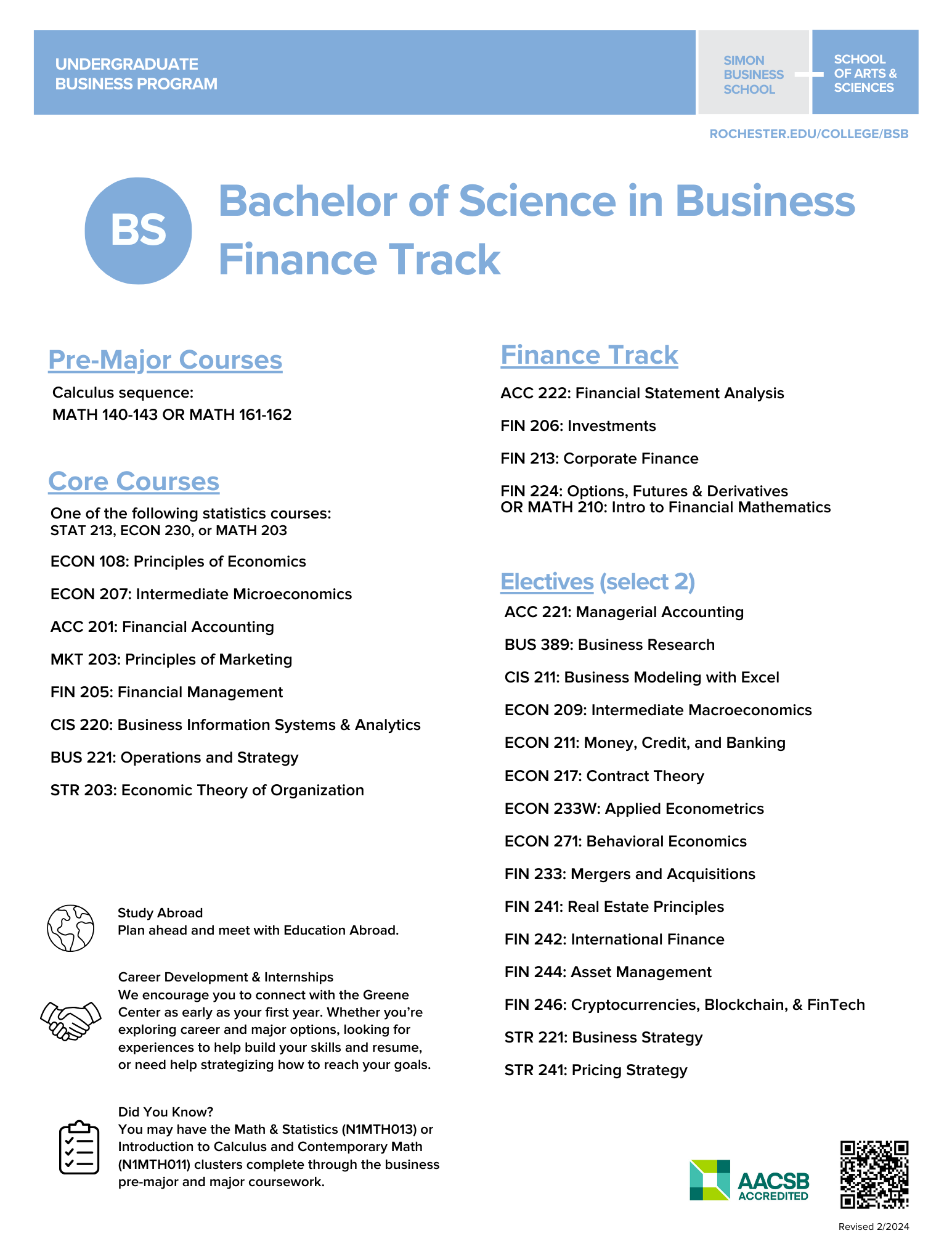 Students in the finance track will gain the necessary understanding of how individuals and companies raise funds and invest in financial markets. Starting with an understanding of the time value of money, students then explore theories of investing, an understanding of risk and strategies to hedge risk, and the application of these theoretical concepts to areas such as financial decisions within a corporation, the evaluation and pricing of mergers and acquisitions and specialized investment areas such as real estate and cryptocurrencies. Students who complete the financial track are well-positioned to be financial analysts in brokerage firms, banks, corporate finance departments, insurance companies, and an increasing number of FinTech companies that are merging principles of technology (AI) with traditional financial activities.
Students in the finance track will gain the necessary understanding of how individuals and companies raise funds and invest in financial markets. Starting with an understanding of the time value of money, students then explore theories of investing, an understanding of risk and strategies to hedge risk, and the application of these theoretical concepts to areas such as financial decisions within a corporation, the evaluation and pricing of mergers and acquisitions and specialized investment areas such as real estate and cryptocurrencies. Students who complete the financial track are well-positioned to be financial analysts in brokerage firms, banks, corporate finance departments, insurance companies, and an increasing number of FinTech companies that are merging principles of technology (AI) with traditional financial activities.
FIN 206: Investments (S)
FIN 213: Corporate Finance (F)
ACC 222: Financial Statement Analysis (S)
FIN 224: Options, Futures & Derivatives (F) or MATH 210: Introduction to Financial Mathematics (F/S)
Two of the following:
- ACC 221: Managerial Accounting (S)
- BUS 389: Business Research (S)
- CIS 211: Business Modeling with Excel (F/S)
- CIS 279: Generative AI and Business Applications (S)
- ECON 209: Intermediate Macroeconomics (F/S)
- ECON 211: Money, Credit, and Banking (S)
- ECON 233W: Applied Econometrics (S)
- ECON 271: Behavioral Economics (F)
- FIN 233: Mergers and Acquisitions (S)
- FIN 241: Real Estate Principles (F)
- FIN 242: International Finance (F, even years)
- FIN 244: Asset Management (S, odd years)
- FIN 246: Cryptocurrencies, Blockchain, and FinTech (S)
- STR 221: Business Strategy (offered next SP 27)
- STR 241/ECON 241: Pricing Strategy (F)
F= offered fall semester
S= offered spring semester
F/S= offered both fall and semesters
Information Systems Track (6 Courses)
The information systems track is a joint offering between Simon Business School and the Department of Computer Science. Students completing this track will learn the core knowledge of computer science, including discrete math, software development, data structures, and algorithms. Depending on the electives chosen, students may also learn about mobile app development, predictive analytics, and databases. A basic knowledge of information systems is helpful in a wide variety of business careers, including software development, product development, application development, and technology management.
MATH 150: Discrete Math (F/S)
CSC 171: Intro to Computer Science (F/S/SM)
CSC 172: Data Structures and Algorithms (F/S/SM)
Three of the following:
CIS 240: Data Management and Descriptive Analytics for Business (F) or CSC 261: Database Systems (F/S/SM)
CIS 242: Predictive Analytics for Business (S) or CSC 240: Data Mining (F/S)
CIS 245: Social Media and Text Analytics (S)
CIS 279: Generative AI and Business Applications (S)
CSC 170: Intro to Web Development (F/S)
CSC 210: Web Programming (S)
CSC 214: Mobile App Development F (iOS) / S (Android) / SM (iOS)
F= offered fall semester
S= offered spring semester
SM= offered summer
Marketing Track (6 Courses)
Students in the marketing track will learn to develop and implement effective marketing strategies, which are crucial for driving business growth and leading innovation. Through a diverse range of electives, students have the opportunity to explore conducting market analysis, developing digital strategies, fostering brand development, creating compelling marketing campaigns and effective communication, and making ethical, strategic decisions in competitive business environments. These competencies will not only facilitate a seamless transition into industry roles but also provide a strong foundation for advanced studies in graduate school.
Choose at least (4), up to (6) from the list below:
MKT 212: Marketing Research and Analytics (S)
MKT 213: Marketing Projects and Cases (F/S)
MKT 233: Advertising and Promotional Strategy (F)
MKT 235: Product and Brand Strategy (F)
MKT 237: Digital Marketing Strategy (S)
STR 241: Pricing Strategy (F)
Then, choose the
- BUS 118: Business Ethics (S)
- BUS 201: Impactful Presentations (F/S)
- BUS 219: Negotiations (next offered SP 2027)
- BUS 389: Business Research (S)
- CIS 211: Business Modeling with Excel (F/S)
- CIS 245: Social Media and Text Analytics (S)
- CIS 279: Generative AI and Business Applications (S)
- STR 221: Business Strategy (offered next SP 2027)
- STAT 221W: Sampling Design (F)
F= offered fall semester
S= offered spring semester
F/S= offered both fall and semesters
Students can use the following worksheets to help plan their courses:

